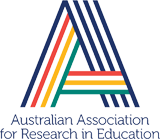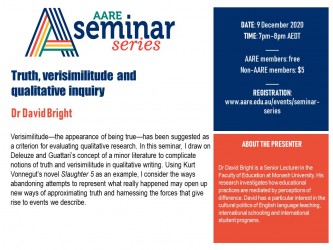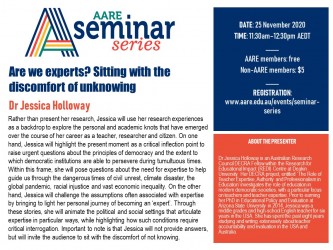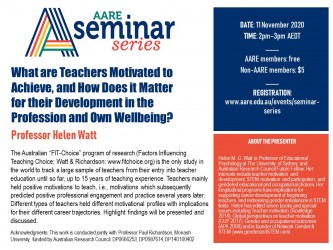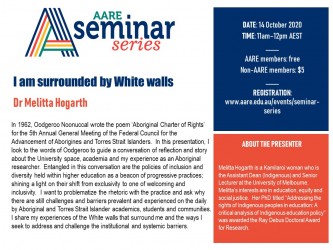
# SeminarSeries
The association offered the AARE Seminar Series in 2020 after having postponed the conference due to COVID-19.
Conference Co-Chairs Dr Amanda Heffernan and A/Prof Stewart Riddle curated an exciting line-up of presenters.
2020 Seminar Series
2020
Truth, verisimilitude and qualitative inquiry 9 December 2020 (6 pm AEST, 7pm AEDT)
Verisimilitude—the appearance of being true—has been suggested as a criterion for evaluating qualitative research. In this seminar, I draw on Deleuze and Guattari’s concept of a minor literature to complicate notions of truth and verisimilitude in qualitative writing. Using Kurt Vonnegut’s novel Slaughter 5 as an example, I consider the ways abandoning attempts to represent what really happened may open up new ways of approximating truth and harnessing the forces that give rise to events we describe.
Dr David Bright is a Senior Lecturer in the Faculty of Education at Monash University. His research investigates how educational practices are mediated by perceptions of difference. David has a particular interest in the cultural politics of English language teaching, international schooling and international student programs.
2020
Are we experts? Sitting with the discomfort of unknowing 25 November 2020 (11:30am AEST)
Rather than present her research, Jessica will use her research experiences as a backdrop to explore the personal and academic knots that have emerged over the course of her career as a teacher, researcher and citizen. On one hand, Jessica will highlight the present moment as a critical inflection point to raise urgent questions about the principles of democracy and the extent to which democratic institutions are able to persevere during tumultuous times. Within this frame, she will pose questions about the need for expertise to help guide us through the dangerous times of civil unrest, climate disaster, the global pandemic, racial injustice and vast economic inequality. On the other hand, Jessica will challenge the assumptions often associated with expertise by bringing to light her personal journey of becoming an ‘expert’. Through these stories, she will animate the political and social settings that articulate expertise in particular ways, while highlighting how such conditions require critical interrogation. Important to note is that Jessica will not provide answers, but will invite the audience to sit with the discomfort of not knowing.
Dr Jessica Holloway is an Australian Research Council DECRA Fellow within the Research for Educational Impact (REDI) Centre at Deakin University. Her DECRA project, entitled ‘The Role of Teacher Expertise, Authority and Professionalism in Education’ investigates the role of education in modern democratic societies, with a particular focus on teachers and teacher expertise. Prior to earning her PhD in Educational Policy and Evaluation at Arizona State University in 2014, Jessica was a middle grades and high-school English teacher for six years in the USA. She has spent the past eight years studying and writing extensively about teacher accountability and evaluation in the USA and Australia.
What are Teachers Motivated to Achieve, and How Does it Matter for their Development in the Profession and Own Wellbeing? 11 November 2020 (1:00pm AEST)
The Australian “FIT-Choice” program of research (Factors Influencing Teaching Choice; Watt & Richardson: www.fitchoice.org) is the only study in the world to track a large sample of teachers from their entry into teacher education until so far, up to 15 years of teaching experience. Teachers mainly held positive motivations to teach, i.e., motivations which subsequently predicted positive professional engagement and practice several years later. Different types of teachers held different motivational profiles with implications for their different career trajectories. Highlight findings will be presented and discussed.
ABOUT THE PRESENTER
Helen M. G. Watt is Professor of Educational Psychology at The University of Sydney, and Australian Research Council Future Fellow. Her interests include teacher motivation and development, STEM motivation and participation, and gendered educational and occupational choices. Her longitudinal programs have implications for supporting career development of beginning teachers, and redressing gender imbalances in STEM fields. Helen has edited seven books and special issues including Teacher motivation (Routledge 2014); Global perspectives on teacher motivation (CUP 2017); Gender and occupational outcomes (APA 2008) and is founder of Network Gender & STEM (www.genderandSTEM.com).
2020
I am surrounded by White walls 14 October 2020 (10:00am AEST)
In 1962, Oodgeroo Noonuccal wrote the poem ‘Aboriginal Charter of Rights’ for the 5th Annual General Meeting of the Federal Council for the Advancement of Aborigines and Torres Strait Islanders. In this presentation, I look to the words of Oodgeroo to guide a conversation of reflection and story about the University space, academia and my experience as an Aboriginal researcher. Entangled in this conversation are the policies of inclusion and diversity held within higher education as a beacon of progressive practices; shining a light on their shift from exclusivity to one of welcoming and inclusivity. I want to problematize the rhetoric with the practice and ask why there are still challenges and barriers prevalent and experienced on the daily by Aboriginal and Torres Strait Islander academics, students and communities. I share my experiences of the White walls that surround me and the ways I seek to address and challenge the institutional and systemic barriers.
Melitta Hogarth is a Kamilaroi woman who is the Assistant Dean (Indigenous) and Senior Lecturer at the University of Melbourne. Melitta’s interests are in education, equity and social justice. Her PhD titled “Addressing the rights of Indigenous peoples in education: A critical analysis of Indigenous education policy” was awarded the Ray Debus Doctoral Award for Research.
Educating Aboriginal children after massacre: Adorno in Australia and the culturally responsive movement 30 September 2020, 7:00pm AEST
Drawing upon Adorno's essay, Education after Auschwitz, this paper investigates the role of teacher pedagogy in the memory of Australian violence and its violence to memory. The call for decolonising schools after terrible atrocities are not new. However, unlike Australia, German and South African education systems structurally acknowledge their brutal past. This is in spite of Australian massacres occurring centuries before Auschwitz. Education after Auschwitz (Adorno, 1998) and What Might Education Mean after Abu Ghraib (Giroux, 2004) place a demand upon teachers and pedagogy to educate society against denial so Auschwitz never happens again. For Adorno, educating from racism and denial into equality is a collective task for democratic societies, education and mature citizens. Present appalling disparities and Australia’s decade of failed educational outcomes for Aboriginal children reveal deep denials about the past and its failed pedagogical project of the present. This paper first critically examines the possibilities of social transformation by schooling in the context of the ‘Uluru Statement’ and today’s unacknowledged silence of Australian massacres, and its effect on disengaged Aboriginal children. Second, I consider these power relations on the Aboriginal learner and its impact on their self-determined agency within Australian classrooms. Third, as a contribution to decolonising education, I outline principles toward a Culturally Responsive Pedagogy as ‘demythologising pedagogy’ for teachers as at present, few exist written by Aboriginal scholars.
Somewhere between the swings and roundabouts: Interdisciplinarity as a tool for navigating the early to mid-career researcher transition 16 September 2020 (11:00 am AEST)
Employing my practices and propensities of artist, teacher and researcher, I’ll share some experiences of traversing liminal spaces in academia from a teacher education perspective, and the resources, materials and strategies that I have found helpful for finding ways and making sense. We’ll start at the space I find myself in at this moment (an ECR on the cusp of mid-career) and backtrack from there via insights gathered up in my traversing of spaces ( / ) between personal/professional, artist/pre-service teacher, classroom teacher/teacher educator, and Arts-based/interdisciplinary researcher. Using visual and textual artefacts as meaning making tools, I hope we can ruminate together on the potential of contested, indeterminate aspects of interdisciplinarity as a means for articulating the experience of becoming generative in and comfortable with the unfamiliar and indeterminate spaces we may encounter in the academic career trajectory.
Unchanged Stories? LGBTIQ+ Teachers and Research 2 September 2020 (11:00am AEST)
Research with LGBTIQ+ teachers is a growing field within broader studies of sexualities and schooling that has historically focused upon the experiences of same sex attracted and gender diverse young people. The experiences of teachers have tended to take a backseat. In the research that has considered the experiences of LGBTIQ+ teachers, a number of key issues continue to appear throughout the literature over time and across contexts; the pressures of working in a sexuality and gender-normative environment; the negotiations between private and professional worlds; and choices around coming out at work. More recently there is also a growing number of trans* and gender diverse voices within the field who remind us how far we have to go still to ensure trans* justice within education. Much of the research with LGBTIQ+ teachers, including my own, shows us that our stories are not happy ones.
In seeking to think differently about our unhappy stories, in this seminar I will work with Sara Ahmed’s idea of the ‘unhappy queer archive’. Here, I will work to reimagine the figure of the LGBTIQ+ teacher and the stories that we tell. I will consider whether refiguring our unhappy stories as generative interruptions to the normative environments of schools, in Australia and other places, provides us with a way of understanding our experiences differently.
Towards a politics of truth tor schooling in Australia 19 August 2020 (4:00pm AEST)
Unfortunately, educators in Australian schools now have their work constituted inside of a reform agenda that is increasingly under duress: (i) the performance of Australian students has declined at all levels of achievement compared to international benchmarks, and there is evidence mounting that Australia is one of the most unequal education systems amongst the 39 developed countries. But then those driving policy in Australia assert we should continue with the same but just do it harder. In this presentation, I examine the reform agenda for Australian schooling that now operates as a regime of truth. And to frame up my argument I want to make a case for a politics of truth, which examines how truth itself is authorised, and how what counts as truth now gets to hold sway.
The presentation makes a case that schooling suffers from a power/knowledge problem, that is multi-dimensional. The presentation interrogates: (i) four key neoliberalising policy rationales of the past decade: devolution, standardisation, parental choice, and accountability through high stakes testing; the School Effectiveness /School Improvement paradigm (SE/SI) that works in tandem with neoliberalising logics; and (iii) the radical disconnect between the official knowledge that is taught in schools and the challenges facing the communities that we all live in, and the nation. The presentation ends with a discussion of the scaling up of classroom-based curriculum and pedagogy redesign projects to the knowledge producing school.
Higher education and the colonial project: Rights-based leadership and change 5 August 2020 (4:00pm AEST)
The growth of Indigenous academic participation in Australian universities is irrefutably important. A sense of urgency to maximise participation in the sector is shared by the federal government through policy drivers linked to Indigenous student support program (ISSP) funding (Scullion, 2017) and Universities Australia's (UA) Aboriginal and Torres Strait Islander Education Strategy 2017-2020 (Universities Australia, 2017). More recently, it is also shared by commissioning the Department of Education and Training (DET) of the National Aboriginal and Torres Strait Islander Higher Education Consortium (NATSIHEC) Aboriginal Corporation to review the higher education sector its final report, Accelerating Indigenous Higher Education (NATSIHEC, 2018).
In this AARE seminar, I will discuss that while this sense of urgency is commendable, the challenge lies in moving towards a proactive and meaningful engagement with Indigenous Australia and to move beyond the current situation, which would indicate from an Aboriginal and Torres Strait Islander standpoint, that the colonial project of education in Australia is alive and well.
Research Quality in the era of ERA 22 July 2020 (11:00am AEST)
Division 13 Education scored a national average of 2.2 in the first 'Excellence for Research in Australia' exercise conducted in 2010, a score that was well below 'world standard'. Fittingly, AARE swung into action with the 'Living in a 2.2 World' report, which directed attention to the diversity of outputs then being directed to Division 13 (e.g., 37% from AOUs outside Education). Since then, Division 13's performance has improved with each ERA round, scoring 2.4 nationally in 2012, 2.9 in 2015, and 3.0 in 2018. Whilst a positive trend, improvement has been slow and incremental with gains coming mainly from the lower end and less so at the very top. As Education is a peer review discipline, the quality of publications is a critical factor in our ERA performance. In this AARE seminar, I dissect "the publication" to present indicators of quality for each of its constituent parts: the abstract, introduction, literature review, conceptual framework, methodology, discussion, conclusion, tables, figures and references. These indicators of quality are reflections based on a decade and a half of pitched battles with Reviewer #2, in addition to time spent as Editor-in-Chief of AER and reviewing for ERA 2015 and 2018. The aim of this seminar is to share the habits of and strategies employed by excellent education researchers, as reflected in their publications, to help position Division 13 for a collective lift in ERA 2023.
"Be careful who you associate with:" In dialogue with the AARE President 8 July 2020 (7:00om AEST)
As a child, I recall well-meaning adults advising me to be careful who I associated with. It’s not something I gave too much thought to then or since, but being asked to give this talk to members of our association at a time when so many of our ways of associating have been disrupted has made me think about this question and helped to frame the discussion I want to have with members.
Interestingly, our constitution has very little to say about how we associate. It sets out the purpose of AARE and how it is organised. Instead, it is our recently created code of conduct that speaks to the terms of our association and how we relate to each other - our responsibility to treat each other with respect, to not encourage or participate in bullying or intimidation, to adopt appropriate language in our communications, to act honesty in all dealings with other members, to behave ethically, and to not discriminate against any person. It's an impressive list of intentions but what happens when we fall short? How might our organisation's response be underpinned by an ethics of care that's framed by an educative rather than a punitive purpose?
In this seminar (dialogue), I hope to present some scenarios that facilitate discussion about these questions and that strengthen the basis of our Association.
